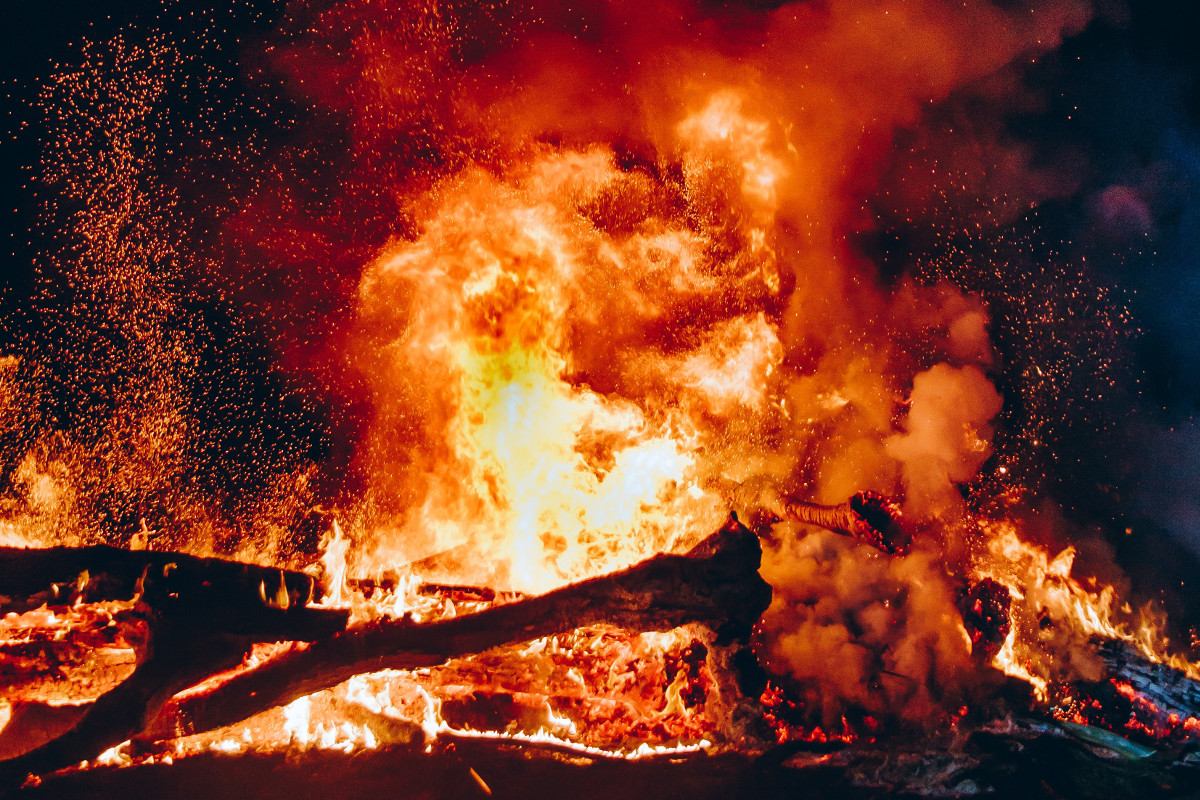
by DGR News Service | Sep 17, 2019 | Agriculture, Biodiversity & Habitat Destruction
by Liam Campbell
In 1997, forest fires in Indonesia grew so large that they accounted for 40% of global emissions during that period. The Borneo rainforest is the most ancient in the world, having taken 120 million years to evolve into its current state of rich diversity. Indonesia is also home to some of the world’s largest tropic peat bogs, deep and vast stockpiles of carbon which have formed over millennia. When these peat bogs ignite they are almost impossible to extinguish because they burn deeply into the Earth and smoulder for weeks or even months, and they can also release millions of years worth of stored carbon into the atmosphere very suddenly. Although seasonal fires are common in the Borneo, climate collapse has made the rainforest more susceptible, and the magnitude of this year’s fires are already unfathomable.
Many of the fires we’re seeing right now are caused by exploitative agriculturalists who are burning the rainforest to open land up for human crops and livestock. In doing so, they are destroying 120 million years of evolution and rapidly annihilating one of the Earth’s most diverse and ancient living ecosystems. Although Indonesia claims to be doing “everything in their power” to extinguish the fires, they are not doing nearly enough to prevent them from happening in the first place. Only about 200 suspects have been arrested in relation to the arsons, and it is likely that many of them will be released without charges or consequences. It is understandable that individual farmers may be tempted by the prospect of opening more land for profitable exploitation, but the act of burning such an ancient ecosystem is among the worst crimes a human can commit; it not only endangers the rest of the planet’s climate, it destroys one of the most ancient living systems on this planet.
Most of the fires were started by palm oil plantations, which are often owned by large corporations. Officials estimate that about 80% of the fires were set intentionally and they now number in the thousands, with 2,900 especially bad hot spots. In all, only about two dozen palm oil plantations have been temporarily shut down in connection to arsons, they are primarily owned by Malaysian and Singaporean companies. These companies are unlikely to face significant charges or repercussions, and will likely return to increasingly profitable business after paying fines.
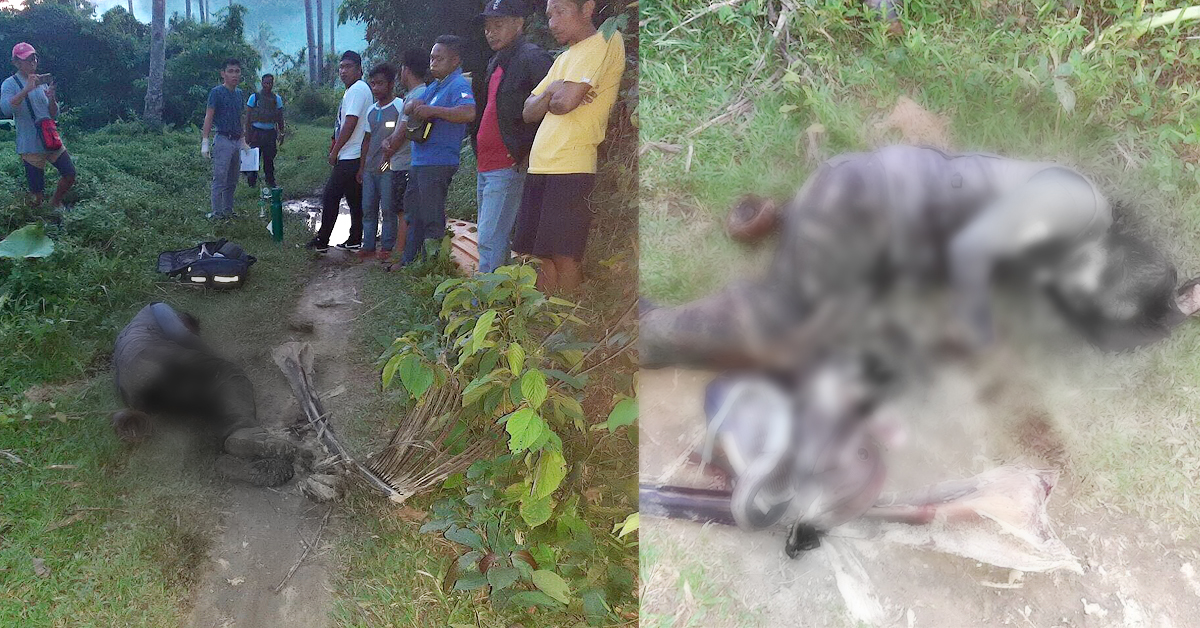
by DGR News Service | Sep 10, 2019 | Biodiversity & Habitat Destruction, Human Supremacy
Image: PRO MIMAROPA
by Liam Campbell
Forest ranger Bienvinido “Toto” Veguilla, Jr. was murdered last week while attempting to stop illegal loggers from ransacking a section of forest in the Philippines. Veguilla was on a routine patrol in the Sitio Kinawagan, Barangay Pasadeña region when he and fellow rangers discovered a group of illegal loggers using a chainsaw and other equipment to destroy the ecosystem for profit. After confiscating their equipment Veguilla and his team departed for their station, but were followed by the illegal loggers and eventually attacked. Unfortunately, Veguilla was unable to escape and was hacked to death by approximately six men.
Veguilla’s murder is a great loss to conservation efforts in the Philippines; he was known as one of the most diligent, hardworking, and courageous members of the Department of Environment and Natural Resources (DENR). He is not the first ranger to be murdered — in 2017, captain Ruben Arzaga was also murdered by illegal loggers in retaliation for his conservation efforts.
These brave individuals and their colleagues risk their lives on a daily basis to protect Earth’s dwindling ecosystems against destruction, often facing death threats and severe retaliation. Sometimes it is easy for environmental activists in priveleged countries to lose sight of the brutal realities facing their comrades in other parts of the world. Next time you hear someone moralizing about the virtues or necessity of pacifism, remember that those notions are an extreme luxury and that the individuals who preach those sermons are generally far removed from risking life or limb.
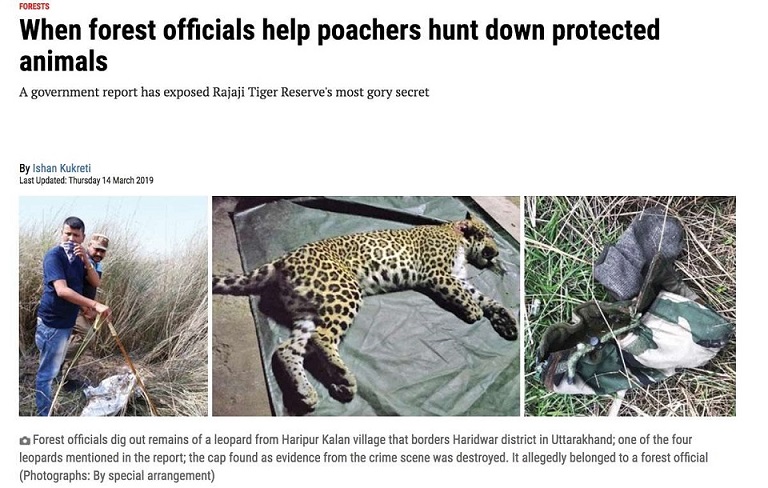
by Deep Green Resistance News Service | Mar 17, 2019 | Colonialism & Conquest
Featured image: The collusion between officials and poachers was exposed in India’s Down to Earth magazine. © Down to Earth
by Survival International
Park officials in India’s Rajaji Tiger Reserve colluded with poachers in the killing of endangered leopards, tigers and pangolin, according to an investigation by a senior wildlife officer.
The accused officials range from the park director to junior guards. WWF-India boasts that it trained “all Rajaji frontline staff in skills that were vital for protection,” including law-enforcement. It also provided vehicles, uniforms and essential anti-poaching equipment to the guards.
The investigation, reported in India’s Down to Earth magazine, found that not only were officials helping to hunt down and kill wildlife, they also beat and tortured a man named Amit – an innocent villager who was trying to stop the poaching.
Officials are reported to have arrested Amit under false charges, resulting in him being detained for up to a month. He was also beaten and given electric shocks by a wildlife warden and two range officers.
These revelations of serious human rights abuses by guards trained and supported by WWF follow the recent Buzzfeed exposés that WWF funds guards who kill and torture people.
The involvement of those supposed to protect wildlife in hunting is common. A UN report in 2016 confirmed that corrupt officials are at the heart of wildlife crime in many parts of the world, rather than tribal peoples who hunt to feed their families.
Stephen Corry, Survival International’s Director, said today: “Rangers who poach as well as violate human rights won’t surprise those environmentalists who’ve been speaking against fortress conservation for years. Corrupt rangers often collude with poachers, while tribal people, the best conservationists, bear the brunt of conservation abuses.”
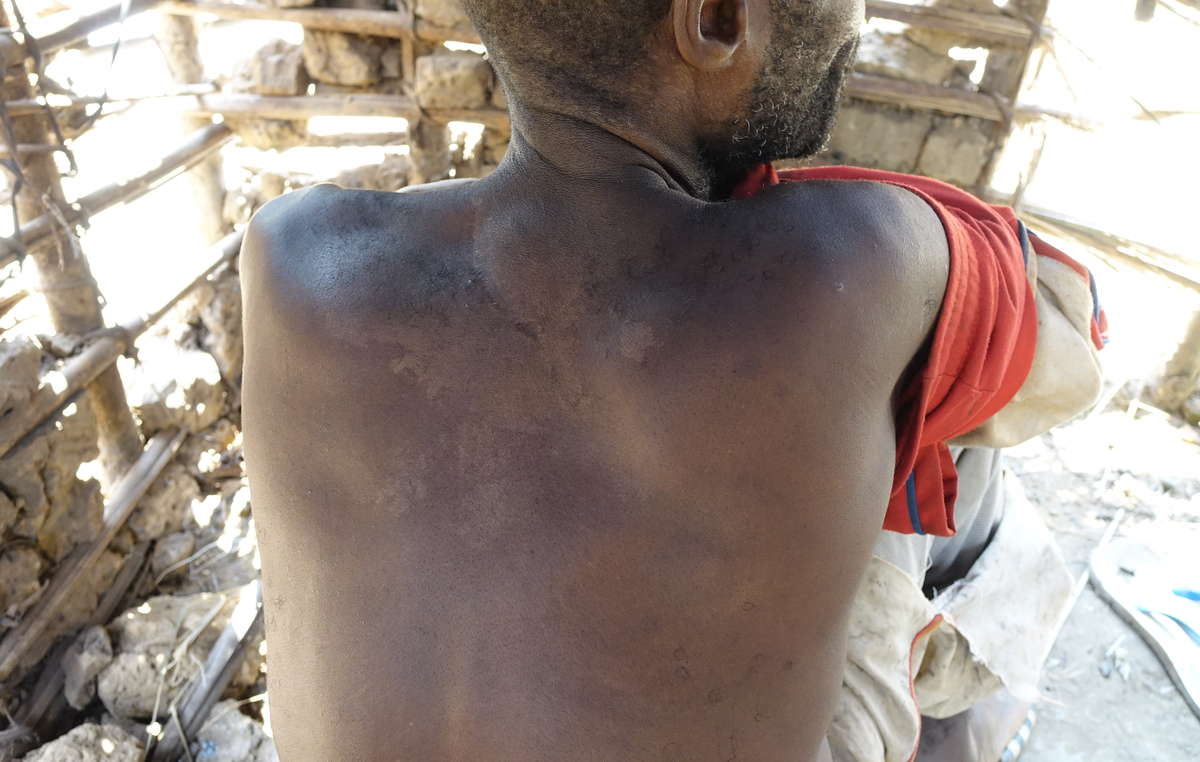
by Deep Green Resistance News Service | Mar 9, 2019 | Colonialism & Conquest
Featured image: A man from a village near the proposed Messok Dja national park shows scars from a beating he received at the hands of ecoguards supported and funded by World Wildlife Fund. © Fiore Longo/Survival International
by Gabriella Rutherford, Survival International / Intercontinental Cry
The dense Messok Dja rainforest has been home to the Baka Peoples since time immemorial. But now the forest is being closed off to them to make way for a new national park. Although the park hasn’t been formally established, the Baka are being driven from their homes and deprived of their vital lifeline of forest resources—with devastating results.
For nearly a decade, the World Wide Fund for Nature (WWF) has been working with the Congolese government to set up the Messok Dja National Park with the help of funding bodies like the European Commission (EC), the US Fish and Wildlife Service (USFWS) and the United Nations Development Programme (UNDP).
During this time, WWF-funded park rangers have actively patrolled the area. The Baka, who are vehemently opposed to the national park, have routinely denounced the rangers, whom they accuse of violence, discrimination and torture.
One Baka woman described how “The wildlife guards just want to kill us. Once, I had just gone to do some dam-fishing. I was coming back with some fish to grill in packages made of leaves, to eat with my husband and children. I’m coming back with the pot of fish, I put it down. Just like that, the ecoguards grab me: Bam, bam, bam. For no reason. I hadn’t provoked them, I didn’t owe them anything. They just beat me and I don’t even know what for.”
Another man reported, “We just suffer these terrible beatings here for nothing. If they see us, they just beat us with machetes. Bam, bam, bam [on your body].”
In 2011, park rangers operating in the area were involved in a string of events that led to the death of 10-year old Christine Mayi.
In the face of such persecution, many Baka have retreated from the forests to live in road-side camps. Already they are being forced to abandon their age-old tradition of “molongo” – going deep into the forest for extended periods to hunt and gather. This is now impossible as one Baka woman explained:
“How can I go into the forest?…I just go round in circles here. At this time of year I gather wild mangos, [but] now I just stay close to the road. I just gather the mangoes that are near here.. that’s their forest – they’ve taken it.”
Confronted with an alien way of life outside of the forest, the Baka face the very real possibility of food scarcity. “We live from the Lipolo forest: wild mangoes, fish, meat, wild honey and yams, everything… but it’s now blocked off and we’re left to suffer. We don’t know how we can live.”
Conservation-related malnutrition among tribal peoples in the Congo is already a well-documented problem. In 2017, a Congolese organization raised concerns that conservation had contributed to the deaths of several dozen Bayaka children during an epidemic in 2016. The deaths were attributed by a medical expert to malaria, pneumonia and dysentery, aggravated by severe malnutrition.
“We’re suffering here. We don’t know how we’re going to survive. There is nowhere for us to live. It’s as though any value we have is gone.”
And of course, when the Baka now fall ill, they are unable to collect the medicinal plants they need from the forest.
To make matters worse, the Baka communities have never given their consent for the national park, with one local Baka chief explaining, “We can’t agree to it. Everything is there: food, life, health all come from that forest. If we were to give up the forest, we’d be sacrificing our children’s lives, our parents’ lives, our own lives. It would be as if someone were committing suicide.”
The Baka remain resolute in their opposition to the project. The forest is not only key to their survival, it lies at the heart of their sense of community and identity. Life outside it is simply inconceivable to them.
“We Baka, we’re not the type of people who just stay in the village. We’re forest people… Our life, our future is out in the forest. For us and for our children. I know the forest from A-Z. Every root, every tree.”
Many Baka communities have written signed letters of complaint which they asked Survival International to forward to the funders of the proposed park. One letter reads, “If the park is established in our forest, it will be very serious. Instead of working with us, the park rangers have made us suffer so much: they beat us, they whip us with their belts. If that carries on, how will our children live? We are told that according to international law, before starting a project in our forest they need to ask our consent. So we ask you to come here, listen to us and see our suffering, and make sure the law is respected.”
The Baka’s understanding of their legal rights is sound: international law indeed dictates that the free, prior and informed consent (FPIC) of local communities must be obtained for major projects undertaken on their land. Without their consent, Messok Dja National Park is illegal.
In spite of this, WWF is pushing ahead with its plans for Messok Dja and the project continues to enjoy the support of the EC and USFWS as major donors. Neither of these funding bodies or the conservation giant show any signs of pulling the millions of dollars they have committed to the project.
The Baka–who are excellent conservationists in their own right–are adamant that this must change, and reproach those funding the project for their lack of financial responsibility: “[We] want those funding the park to take action. We’ve never seen a white person come to see where their money is going.”
Despite the considerable body of evidence of terrible human rights violations committed against the Baka, WWF has thus far denied any allegations of wrongdoing. A recent tweet read: “As if WWF would allow local communities to be systematically abused, that really is too crazy for words!”
“[We] want those funding the park to take action. We’ve never seen a white person come to see where their money is going.”
In an article written last year, a WWF coordinator described how its ranger team in northern Congo was “fully supported by WWF, and therefore well supervised and equipped.” He went on to praise the team for their efforts to stabilize elephant numbers in the region.
The conservation organization insists that it “takes the allegations seriously.” However it has not replied to any of the community complaints submitted via their whistle-blowing mechanism in July last year regarding the Messok Dja project.
The organization says it aims to respond to complaints made within two weeks.
The European Commission has defended its involvement in the conservation initiative, stressing that Messok Dja “ought to contribute to the improvement of the living conditions of the communities around the park as well as upholding conservation objectives.”
The USFWS was made aware of the situation facing the Baka in Messok Dja in November last year. Survival International has no record of any reply.
The case of Messok Dja National Park and the fate of the Baka tribe is far from an isolated case. Survival International has already reported extensively on the conservation-related human rights abuses in the context of the Congo Basin, Africa and India; it is truly a global problem.
The tribal peoples’ rights organization says that up to 14 million people worldwide have been evicted from their lands in the name of conservation. One study even calculated that the number could be as high 136 million people. In India alone, a recent ruling by the Supreme Court means that some 8 million tribal and other forest-dwelling people could be evicted from their forests due to pressure from conservation groups.
It is clear that neither the scope nor the serious nature of conservation-related problems faced by indigenous and tribal peoples worldwide can be overlooked. Survival International says that the Baka now face “existential threat as a hunter-gatherer tribe” as a result of the Messok Dja conservation initiative.
There are reasons for optimism however.
Survival’s conservation campaign continues to gain momentum and with a damning indictment of WWF’s human rights record published this week by the news platform Buzzfeed, the pressure is now very much on the WWF, and the conservation industry at large, to dramatically change the way it operates and respect tribal peoples’ rights.
Editor’s note: Read more at Cover up: Buzzfeed reveals WWF KNEW locals opposed its flagship park – but hid this from funders.
Learn more about Survival International’s campaign to prevent the illegal eviction of the Baka from their forests here.
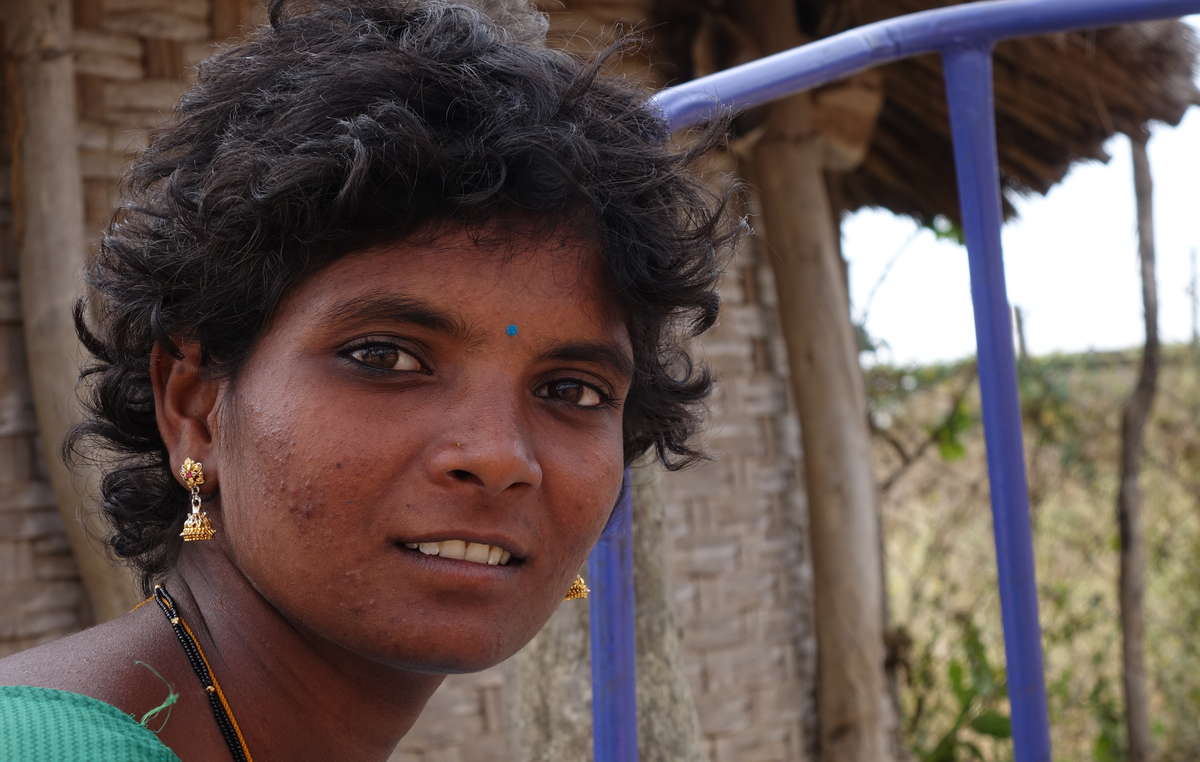
by Deep Green Resistance News Service | Feb 23, 2019 | Colonialism & Conquest
Featured image: Many tribes, like some Chenchu, have already been evicted after their lands were turned into tiger reserves. Now millions more face eviction. © Survival International
by Survival International
India’s Supreme Court has ordered the eviction of up to 8 million tribal and other forest-dwelling people, in what campaigners have described as “an unprecedented disaster,” and “the biggest mass eviction in the name of conservation, ever.”
The ruling is in response to requests by Indian conservation groups to declare invalid the Forest Rights Act, which gives forest-dwelling people rights to their ancestral lands, including in protected areas. The groups had also demanded that where tribespeople had tried and failed to secure their rights under the Act, they should be evicted.
The groups reportedly include Wildlife First, Wildlife Trust of India, the Nature Conservation Society, the Tiger Research and Conservation Trust and the Bombay Natural History Society.
In an extraordinary move, the national government failed to appear in court to defend the tribespeople’s rights, and the Court therefore ruled in favor of the evictions, which it decreed should be completed by July 27.
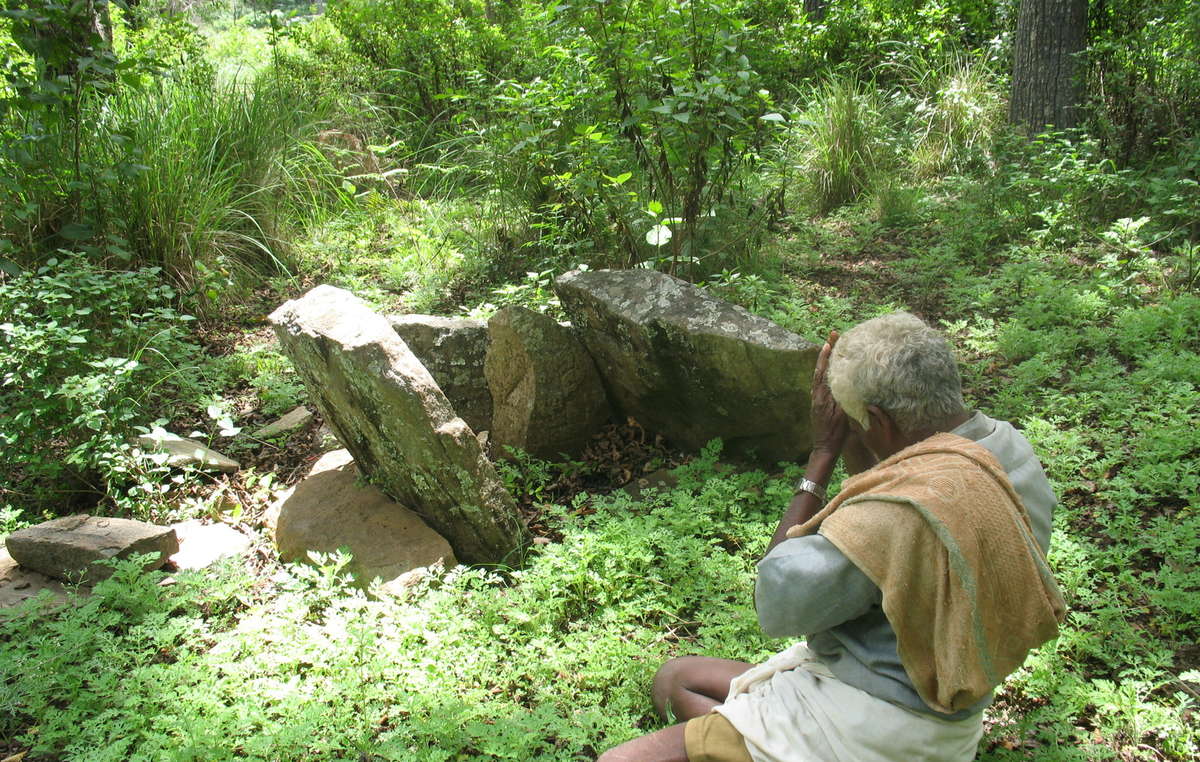
A Soliga man worships at a sacred site, now inside a tiger reserve. © Atree/Survival
The order affects more than 1.1 million households, with experts estimating this could mean more than 8 million individuals will now be evicted – and the number is likely to rise, as some states have not provided details as to how many will be affected.
Survival International’s Director Stephen Corry said today: “This judgement is a death sentence for millions of tribal people in India, land theft on an epic scale, and a monumental injustice.
“It will lead to wholesale misery, impoverishment, disease and death, an urgent humanitarian crisis, and it will do nothing to save the forests which these tribespeople have protected for generations.
“Will the big conservation organizations like WWF and WCS condemn this ruling and pledge to fight it, or will they be complicit in the biggest mass eviction in the name of conservation, ever?”






